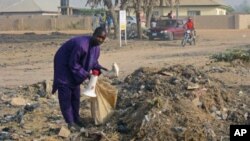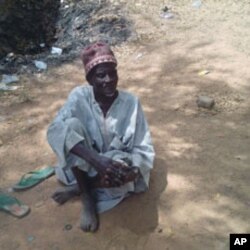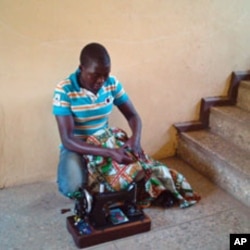Nigeria is Africa's most populous nation and its biggest oil producer. The West African country exports more than two million barrels of crude oil a day.
Despite its oil wealth, however, a new government study says the number of Nigerians sinking into extreme poverty has grown, particularly in the predominantly Muslim north.
VOA sent reporters across the region to hear what some are doing to survive.
"We are headed for trouble"
It is early on this Tuesday morning and Mallam Muhammadu is already at work, scavenging through trash bins and dumps in Nigeria's northeastern city of Yola, in Adamawa state.
This is the only work he can find to feed his family in this city of more than one million people. If he is lucky, he will make 90 cents to $1 after a long day's work. But he said poverty has become so extreme in the oil-rich country, it is difficult to find anything of value these days.
"Can you imagine scratching a living out of filth and then suddenly even the filth you rely on becomes valueless? You can see my bag - empty," he said.
A government report released on February 13 says a majority of Nigerians are living on less than $1 a day, like Muhammadu, even as Nigeria's economy grows.
The National Bureau of Statistics says 61 percent of all Nigerians - nearly 100 million [97.6 million] - made less than a $1 a day in 2010. That is 10 percent higher than the last poverty study in 2004, and the report notes that income inequality also has increased since then.
According to the agency, the worst poverty can be found in northern Nigeria, particularly in the northwest and northeast.
Muhammadu blames government corruption and leaders who, once elected, ignore the plight of their impoverished constituents. He charges that many put self-profit ahead of all else, leaving little for the people and the country's notoriously poor infrastructure. While Nigeria is a major oil producer on the global market, the West African country must import gasoline because it is unable to refine its crude oil at home.
"Our leaders must address this acute poverty or we are headed for trouble," he warned.
Muhammadu ventures into neighborhoods using a bullhorn to announce his arrival. He picks though bins and offers to buy what residents no longer want. Perhaps old shoes or a broken lamp he can repair and sell, or damaged cooking utensils, which he can melt and shape into something new.
"Masses are now rebelling"
Roni Abdullahi Badamasi earns less than $3 a day working as a petty trader in the northern city of Kano, where attacks by a radical Islamic sect have surged this year.
"I am poor and live among the very poor," he said. Badamasi said throughout Kano, Nigeria's second largest city, people are homeless and jobless, and those who do work are finding it more difficult to earn money. Even able-bodied men line up for leftovers at food kiosks.
"Who do you think likes to take free food to his family," he asks.
He said the poor across the predominantly Muslim north do not receive the education needed to compete for jobs and improve their lot. Most in the region attend madrassas, Muslim schools that focus on teachings from the Quran.
"The northern elite only educate members of their immediate families in expensive schools, at the expense of the poor," Badamasi said.
The trader said the current government system is corrupt and unjust. "Our leaders do not care about the underprivileged," he lamented. "That is why the masses are now rebelling against the government."
Northern Nigeria has been besieged by attacks against government forces, police, political figures and moderate Muslim leaders in recent months. Kano has been especially hard-hit.
Government officials blame the violence on a radical Islamic sect known as Boko Haram. The militant group does not recognize Nigeria's constitution and says it is fighting to impose a strict form of Islamic law across the country. Loosely translated, Boko Haram means "Western education is a sin" in the local Hausa language.
The government has vowed to crush the the shadowy group. Some analysts believe that political and criminal elements, though, are behind some of the violence and are using Boko Haram as a guise for their activities.
"We drink from here and so do our livestock"
Adamu Ibrahim lives in a thatch house by a pond in Yola, a city both traditional and modern. Even though Yola serves as Adamawa state's commercial and administrative center, here in Ibrahim's home there is no running water, not even access to clean water.
"See for yourself," he said pointing to the pond. "We drink from here and so do our livestock. Cows, goats, sheep, donkeys and ducks; you name it. This is where we all converge to quench our thirst."
A pregnant woman and her small child drink from the same pond. "We are humans," Ibrahim protests. "Why should we be drinking from the same source with animals? Tell the government what you saw here."
During a meeting in late February, President Goodluck Jonathan chided some leaders of the ruling People's Democratic Party for focusing more on getting re-elected in 2015 than on alleviating poverty for the people they were elected to represent.
Jonathan and his government have been criticized of failing to improve bad governance, rampant corruption, insecurity, education and poverty.
Days after the gathering by ruling party leaders, a former governor pleaded guilty to embezzling $250 million in public funds during his two terms as governor for the oil-rich Delta state.
James Ibori was tried in London after fleeing Nigeria to escape prosecution.
Britain's Department for International Development said Ibori lived "a life of luxury" on money intended for poor Nigerians. The agency estimated he stole roughly $60 for every person in Delta state - money that could have provided an education or clean water for more than 400,000 Nigerians.
"Nigeria has more than enough resources"
In Nigeria's capital, Abuja, Abubakar Mohammed hoists a sewing machine onto his shoulder and walks from door-to-door asking other impoverished residents if they need clothing repaired.
He is a "mobile tailor" who moves through neighborhoods to fix zippers, replace buttons or patch torn clothing. He makes 63 cents per job.
"When I stretch hard from morning until night, I make about $6 or $7, out of which I spend half feeding my family," he said. "My three children are all out of school right now because I can't afford their school fees."
As difficult as things are, Mohammed worries poverty in the city will become as extreme as it is in the villages.
"The government must do something before the situation becomes unbearable," he said.
The poverty study suggests the poverty problem deepened in 2011, according to Dr. Emi Kale, who heads the National Bureau of Statistics. When the agency released its report, Kale expressed hope it would serve as a "tool for candid and constructive public discourse" on Nigeria's poverty.
Sani Zuladaini, a young stone crusher, has little confidence the situation will improve.
"We have realized our government does not care about us, and as youths we do not want to be idle," he said.
Zuladaini makes less than $1 a day manually crushing boulders into various sizes for use in construction in the Niger state town of Minna.
He said he must do this grueling and dangerous work to keep his family and himself from starving.
In the Plateau state city of Jos, cobbler Bala Muhammad said he has started patching umbrellas and fixing old boxes to make more money.
He makes about $1.60 a day to feed and support his two wives and four children, and at times he relies on the kindness of others to feed and house his family.
"Nigeria has more than enough resources to help the poor," he said, "but it lacks good leaders."
Contributing to this report: Hausa Service chief Leo Keyen and reporters Ibrahim Abdulaziz, Medina Dauda, Muhammed Salisu Rabiu, Zainab Babaji, and Nasiru Batsari.











